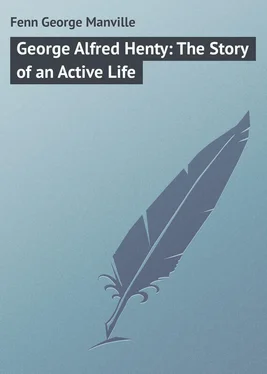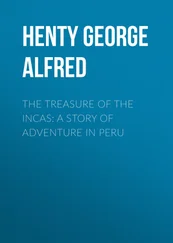George Fenn - George Alfred Henty - The Story of an Active Life
Здесь есть возможность читать онлайн «George Fenn - George Alfred Henty - The Story of an Active Life» — ознакомительный отрывок электронной книги совершенно бесплатно, а после прочтения отрывка купить полную версию. В некоторых случаях можно слушать аудио, скачать через торрент в формате fb2 и присутствует краткое содержание. Жанр: foreign_prose, на английском языке. Описание произведения, (предисловие) а так же отзывы посетителей доступны на портале библиотеки ЛибКат.
- Название:George Alfred Henty: The Story of an Active Life
- Автор:
- Жанр:
- Год:неизвестен
- ISBN:нет данных
- Рейтинг книги:4 / 5. Голосов: 1
-
Избранное:Добавить в избранное
- Отзывы:
-
Ваша оценка:
- 80
- 1
- 2
- 3
- 4
- 5
George Alfred Henty: The Story of an Active Life: краткое содержание, описание и аннотация
Предлагаем к чтению аннотацию, описание, краткое содержание или предисловие (зависит от того, что написал сам автор книги «George Alfred Henty: The Story of an Active Life»). Если вы не нашли необходимую информацию о книге — напишите в комментариях, мы постараемся отыскать её.
George Alfred Henty: The Story of an Active Life — читать онлайн ознакомительный отрывок
Ниже представлен текст книги, разбитый по страницам. Система сохранения места последней прочитанной страницы, позволяет с удобством читать онлайн бесплатно книгу «George Alfred Henty: The Story of an Active Life», без необходимости каждый раз заново искать на чём Вы остановились. Поставьте закладку, и сможете в любой момент перейти на страницу, на которой закончили чтение.
Интервал:
Закладка:
Unfortunately a harder fate attended his only brother, Fred, who left England with him when he obtained his appointment to the Purveyors’ Department, for he was seized by the prevailing epidemic, cholera, and died at Scutari.
Chapter Four.
The First Glimpse of Italy
The department which invalided George Henty and sent him home to recoup did not lose sight of the man who had earned such a good name in the Crimea, and as soon as he was reported convalescent it began to look about for a position in which his services would prove valuable.
Here was a man who, in connection with his duties in the Purveying Department during the late war, had more or less distinguished himself by the acumen he had displayed and the reports he had sent in concerning the state of the temporary hospitals and the treatment of the sick and wounded. There is not much favour shown over such work as his. The fact was patent that in Henty the authorities had a man of keen observation who grasped at once what was wanted in time of war in connection with the movements of an army, one whose mission it was not to direct movements and utilise the forces who were, so to speak, being used in warfare, but who knew how to make himself a valuable aid to supplement doctor and surgeon, and to carry on their work of saving life – in short, the right man in the right place.
So he was selected and sent out to Italy charged with the task of organising the hospitals of the Italian Legion. The very wording of such an appointment as this is enough to take an ordinary person’s breath away. It might have been supposed that the department would have selected as organiser some mature professional man and M.D., with the greatest experience in such matters, ripened in the work and well known as a great authority; but to their credit they grasped the fact that Henty’s experience was proved and real. Book-lore and the passing of examinations were as nothing in comparison with what this young man of twenty-seven had learned in roughly extemporised hospital, tent, and hut amidst the inclemency of a foreign clime, in the face of the horrible scourge of an Eastern epidemic, where the wounded died off like flies, not from the wounds, which under healthy environment would rapidly have healed, but from that deadly enemy, pyaemia, or hospital gangrene. It was this which proved so fatal after the otherwise healing touch of the skilful surgeon’s knife – for these were the days prior to the discoveries made by Lister, which completely revolutionised the surgical art.
While in Italy in 1859 in connection with the hospital work, Henty stored his mind with the results of his observations. They were stirring times. War was on the way; Sardinia’s army, fresh from fleshing its sword in the Crimea, was eager for the fight that was partially to free Italy, and the name of Garibaldi was on every lip, for he and his Red Shirts were burning to attack the hated Austrian. While finding an opportunity to be present at some of the engagements, Henty was busy preparing himself for writing history, and his brain was actively acquiring the language and habits of the people in a way that was an unconscious preparation for a future visit to the country in connection with the duties of a war correspondent.
It was during this visit to Italy in 1859, and while performing his duties of inspector and organiser of the Italian hospitals, that Henty made his first acquaintance with Garibaldi and his enthusiastic army so bent upon freeing Italy from the yoke of Austria. In a number of most interesting letters, picturesque and full of the observation and training that he was gathering for the construction of the series of adventurous stories now standing to his name, he details his meetings with the Red Shirts. Bright, high-spirited boys they were in many cases, ever with the cry of liberty upon their lips, and only too ready to welcome and to fraternise with the daring, manly young fellow who thought as little as they of the personal risks which had to be faced, and who was subsequently to chronicle this portion of their history and the warlike deeds of their chief.
After his return from the organising expedition with the Italian Legion, Henty was placed in charge of the Commissariat Departments at Belfast and Portsmouth, and now held the rank of captain. A plodding life this for a military man with all the making in him of a strong, thoughtful soldier, one who would have become the strongest link in the vertebrae of a regiment, so to speak, the one nearest the brain.
Fate, however did not guide him in that direction, but, as we know now, led him towards becoming the critic of armies instead of an actor in their ranks.
Judging from Henty’s nature and the steadiness and constancy of his life in the pursuit of the career which he chose, it could not have been lightly that he came to the decision that from the way in which he had entered the army there did not seem to be any future for him worthy of his attention, for the British army has always been marked by the way in which birth and money have been the stepping-stones to promotion. Of course there have been exceptions, but the British soldier has never been famed for carrying a field-marshal’s baton in his knapsack, and it is only of comparatively late years that the famous old anomaly of promotion by purchase has died out.
Certainly Henty entered the army as a university man and a gentleman, but he must have begun to feel, taught by experience, that he had gone in by the wrong door, the one which led in an administrative direction and not to the executive with a future of command.
During Henty’s stay in Ireland he had a very unpleasant experience with a rough in Dublin, or rather, to be accurate, a rough in Dublin had a very unpleasant experience with Henty. Somehow or other, while out walking with his young wife, for he was now married, a brutal fellow offered some insult to Mrs Henty, in the purest ignorance of the kind of man whose anger he had roused. One says roused, for in ordinary life Henty was one of the calmest and quietest of men; but he had plenty of chivalry in his composition, and moreover, as has been shown, he had had the education and training of an athlete, leavened with the instructions of the North-country trainer who taught him the jiu-jitsu of his day as practised by a Newcastle man. What followed was very brief, for there was a quick, short struggle, and the Dublin Pat – a city blackguard, and no carrier of a stick – was sent flying over Henty’s head, hors de combat , much surprised at the strength and skill of such a man as he had possibly never encountered before in his life.
Chapter Five.
The Italian War
Henty proved early the excellence of his capabilities, and that he was a man who would be all that was required for the preservation of men’s lives; but such as he meet with scant encouragement, and at last, as said above, he made up his mind to try in a fresh direction, and resigned his commission.
Led no doubt by his leanings, and taught by old experience in connection with his father’s enterprises in coal-mining, he made a fresh start in life in mining engineering, and was for some time in Wales, where his knowledge of mining, and natural firmness and aptitude as a leader and trained controller of bodies of men, made him a valuable agent for the adventurous companies who are ready to open up new ground. His operations were so successful that after a time he entered into engagements which resulted in his proceeding to the Island of Sardinia. Here there was much untried ground to invite the speculation of the enterprising and adventurous; for it is a country rich in minerals, several of them being so-called precious stones, and there seemed excellent promise of profit. A good deal of speculative research was at one time on the way, and here, following his work in Wales, Henty spent some busy years, not, though, without finding the value of his early athletic education, for the lower orders were not too well disposed to the young English manager under whom they worked.
Читать дальшеИнтервал:
Закладка:
Похожие книги на «George Alfred Henty: The Story of an Active Life»
Представляем Вашему вниманию похожие книги на «George Alfred Henty: The Story of an Active Life» списком для выбора. Мы отобрали схожую по названию и смыслу литературу в надежде предоставить читателям больше вариантов отыскать новые, интересные, ещё непрочитанные произведения.
Обсуждение, отзывы о книге «George Alfred Henty: The Story of an Active Life» и просто собственные мнения читателей. Оставьте ваши комментарии, напишите, что Вы думаете о произведении, его смысле или главных героях. Укажите что конкретно понравилось, а что нет, и почему Вы так считаете.












